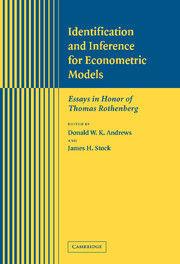Book contents
- Frontmatter
- Contents
- List of Contributors
- Preface
- Part I Identification and Efficient Estimation
- Part II Asymptotic Approximations
- Part III Inference Involving Potentially Nonstationary Time Series
- 15 Tests of the Null Hypothesis of Cointegration Based on Efficient Tests for a Unit MA Root
- 16 Robust Confidence Intervals for Autoregressive Coefficients Near One
- 17 A Unified Approach to Testing for Stationarity and Unit Roots
- 18 A New Look at Panel Testing of Stationarity and the PPP Hypothesis
- 19 Testing for Unit Roots in Panel Data: An Exploration Using Real and Simulated Data
- 20 Forecasting in the Presence of Structural Breaks and Policy Regime Shifts
- Part IV Nonparametric and Semiparametric Inference
19 - Testing for Unit Roots in Panel Data: An Exploration Using Real and Simulated Data
Published online by Cambridge University Press: 24 February 2010
- Frontmatter
- Contents
- List of Contributors
- Preface
- Part I Identification and Efficient Estimation
- Part II Asymptotic Approximations
- Part III Inference Involving Potentially Nonstationary Time Series
- 15 Tests of the Null Hypothesis of Cointegration Based on Efficient Tests for a Unit MA Root
- 16 Robust Confidence Intervals for Autoregressive Coefficients Near One
- 17 A Unified Approach to Testing for Stationarity and Unit Roots
- 18 A New Look at Panel Testing of Stationarity and the PPP Hypothesis
- 19 Testing for Unit Roots in Panel Data: An Exploration Using Real and Simulated Data
- 20 Forecasting in the Presence of Structural Breaks and Policy Regime Shifts
- Part IV Nonparametric and Semiparametric Inference
Summary
ABSTRACT
This paper presents the results of a Monte Carlo study that compares the small sample performance of various unit root tests in short panels using simulated data that mimic the time series and cross sectional properties of commonly used firm level variables. Our conclusion is that in the presence of firm-level heteroskedasticity two methods are preferred, depending on the nature of the preferred alternative: the simplest method based on the ordinary least squares regression of the variable under consideration on its own lag and a version with a more complex alternative hypothesis suggested by Im, Pesaran, and Shin. The paper also reports the results of using these tests for sales, employment, investment, R&D, and cash-flow in three panels of large French, Japanese and US manufacturing firms. In most cases our data reject the presence of a unit root in favor of a first order autoregressive model with a very high autoregressive coefficient, so high that fixed effects are of negligible additional importance in the model.
INTRODUCTION
In this paper, we investigate the properties of several unit root tests in short panel data models using simulated data that look like the data typically encountered in studies on firm behavior. This investigation arose from a previous exploration of a simple question – could we find a simple parsimonious model that accounts for the time series properties of key observable variables characterizing the behavior of individual firms: sales, employment, investment, R&D, and cash flow or profits in France, Japan and the United States.
Information
- Type
- Chapter
- Information
- Identification and Inference for Econometric ModelsEssays in Honor of Thomas Rothenberg, pp. 451 - 479Publisher: Cambridge University PressPrint publication year: 2005
Accessibility standard: Unknown
Why this information is here
This section outlines the accessibility features of this content - including support for screen readers, full keyboard navigation and high-contrast display options. This may not be relevant for you.Accessibility Information
- 11
- Cited by
